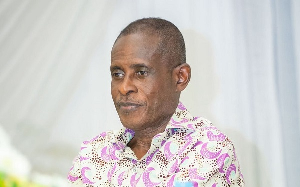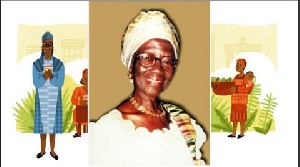Esther Ocloo, 83, African Leader and Microlending Pioneer, Dies
Esther Afua Ocloo, who as a young woman turned a gift of less than a dollar into 12 jars of marmalade — which she sold for a profit — and went on to become one of Ghana's leading entrepreneurs and a prominent exponent of the role of women in economic development, died on Feb. 8 in Accra, Ghana. She was 83.
Her husband, Stephen, said she died of pneumonia in Accra Military Hospital.
As the first chairwoman of Women's World Banking, Ms. Ocloo was one of the pioneers of microlending, the financing of homespun businesses, predominantly run by women, through very small loans, sometimes as little as $50. If a business prospers and the loan is repaid — as more than 98 percent are — then a larger loan is made available.
Large lending institutions give microlending institutions, like Women's World Banking, big loans of, say, $5 million. The money is then parceled out in small loans, at interest rates slightly higher than normal commercial bank rates, for enterprises as simple as drying fish.
Nancy Barry, president of Women's World Banking, said that 25 million people, three-quarters of them women, had received microloans in more than 40 less-developed countries. Half the loans are from Women's World Banking.
The idea was born at the 1975 Mexico City conference that proclaimed the United Nations Decade for Women. Ms. Ocloo found that ideas she had been developing with women in Ghana were also percolating elsewhere. The premise was simple: more than education, health care or family planning, women in poor countries need money in their pockets.
The other early leaders in the movement were Michaela Walsh, a New York investment banker, and Ela Bhatt, founder of a cooperative bank for illiterate women in India. They and several allies founded Women's World Banking in 1979 with Ms. Ocloo as chairwoman.
Ms. Barry said that concentrating on women made sense because they are discriminated against in borrowing; they do the majority of artisanal work and much of the farming, and they have a keener sense of the interdependence of generations.
Ms. Ocloo, in a speech in 1990, gave a starkly practical explanation.
"Women must know that the strongest power in the world is economic power," she said. "You cannot go and be begging to your husband for every little thing, but at the moment, that's what the majority of our women do."
Esther Afua Nkulenu was born in Peki-Dzake in the Volta region of Ghana on April 18, 1919. Her parents were poor farmers, but she was able to attend high school with the help of scholarships offered to young women by Cadbury, the chocolate company, which was a major buyer of Ghana's cocoa crop.
Her mother, with tears in her eyes, sent her off to Accra with just a sixpence. After graduating, she lived with relatives in the city. An aunt gave her 10 shillings, worth less than one United States dollar. She bought sugar, firewood, oranges and 12 jars, and made marmalade jam, which she sold for a shilling a jar.
"I was ridiculed by all my classmates, who saw me hawking marmalade on the street like an uneducated street vendor," rather than seeking an office job, she said.
But she plowed her profits back into the business. She also took some of her marmalade to her old high school and won a contract to supply the entire school. Soon, school officials asked her to supply orange juice from orange trees on its grounds.
She next got a contract to supply juice to the military, but lacked the necessary funds to produce it. Though she had no collateral, she persuaded a bank to give her a loan on the basis of the contract. The result was her company, Nkulenu Industries, which grew to produce products like canned tomatoes and soup bases.
After six years, she had saved enough money to go to Britain to study food technology, preservation, nutrition and agriculture. She also learned leatherwork and lampshade- making in the hope of sharing the skills with rural women back home.
Even as she continued running her own company upon her return, she devoted more and more of her time to improving women's economic situation. For example, she established her own program on a farm to train women in agriculture, preparing and preserving food products and making handicrafts.
She paid for the program in part with her half of the Africa Prize, a $100,000 award she split with Olusegun Obasanjo, the current president of Nigeria, in 1990. It was presented by the Hunger Project for their leadership in working to end hunger in Africa.
She liked to keep things simple, as when she taught business management skills to women involved in cooking and selling food on the streets.
"I have taught them to cost the things they sell and determine their profits," she said. "You know what we found? We found that a woman selling rice and stew on the side of the street is making more money than most women in office jobs — but they are not taken seriously."
Ms. Ocloo, who always wore bright African clothes and loved to cook traditional meals, preferred to be known as Auntie Ocloo, in the Ghanaian tradition. She usually began meetings of bankers and others with a prayer, and often ended them with a song: "We Are Wonderful."
The day she entered the hospital she gave a speech urging women to carry on her campaign for micro- lending. Days before she died, she was on the phone from her hospital bed to governmental officials arguing that microloans, rather than grants, should be specified in Ghana's new budget.
In addition to her husband, she is survived by her sister, Georgina Nkulenu; her daughter, Vincentia Canacco; her sons Vincent Malm, Christian Biassey and Stephen Jr., and six grandchildren.
She once said her children complained that the women she trained competed against her.
"I don't listen," she said. "My main goal is to help my fellow women. If they make better marmalade than me, I deserve the competition."
General News of Sunday, 10 March 2002
Source: DOUGLAS MARTIN
Tribute To Esther Ocloo in NY Times
Opinions












